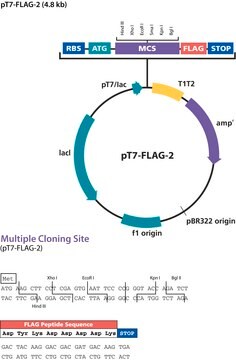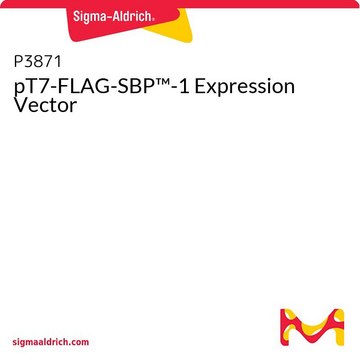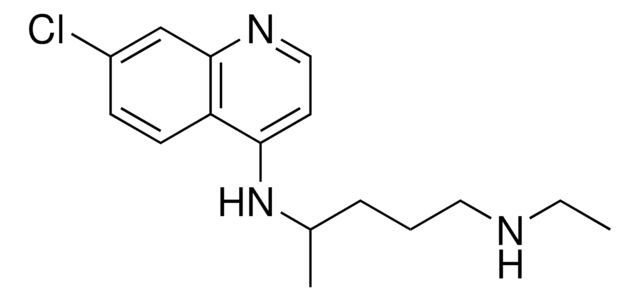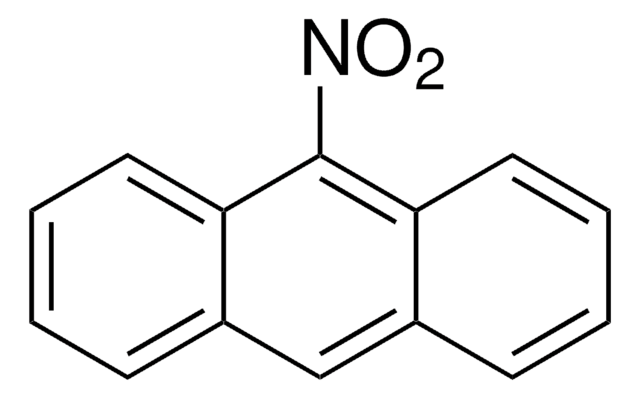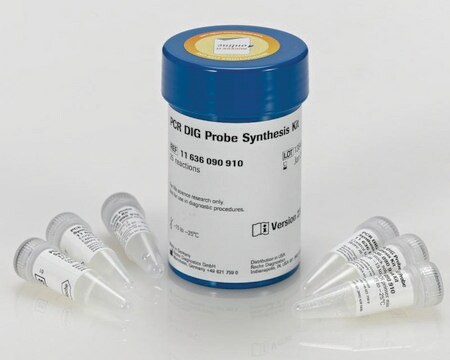推荐产品
籤條
FLAG® tagged
形狀
buffered aqueous solution
菌種選擇
kanamycin
複製起點
pUC (500 copies)
肽切割
TEV
no cleavage
肽標籤位置
C-terminal
N-terminal
啟動子
Promoter name: OXB20
Promoter activity: constitutive
Promoter type: bacterial
運輸包裝
ambient
儲存溫度
−20°C
一般說明
Molecular cloning often benefits from optimizing the vector used for expression.
This pack enables you to compare placing FLAG epitope tags at either the N or C terminus of your gene of interest (inserted into the MCS, under transcriptional control of the OXB20 strong bacterial promoter) with, and also without a TEV (Tobacco Etch Virus) protease cleavage site. The TEV site enables removal of the FLAG tag from the protein following production. Comparing these four configurations should enable you to evaluate how best to express and detect your gene of interest from bacterial cells. We also provide many other functional tags and cleavage sites, if required.This plasmid set has been designed to be compatible with a range of cloning techniques. The multiple cloning site contains a range of standard commonly used restriction sites for cloning. Using these sites genes can be inserted using standard cloning methods with DNA ligase. Other methods such as ligase independent cloning (LIC) Gibson Assembly InFusionHD or Seamless GeneArt can also be used and because all of our plasmids are based on the same backbone the same method can be used for cloning into all of our catalogue vectors.
Multiple cloning site notes: There are a few important sites within the MCS. These include the NcoI site the XbaI site and the BsgI and BseRI sites. The NcoI site contains a start codon that is immediately downstream of both a Kozak and Shine-Dalgarno ribosomal binding site. These allow for optimal positioning of genes when the start codon is placed in this location. If this is not required and you wish to use a downstream site for gene cloning you can remove the NcoI site by cleaving the plasmid with KpnI. The XbaI site contains a stop codon. This stop codon is positioned in a specific position in relation to the BsgI and BseRI sites that are immediately downstream. When either BseRI or BsgI cleave the plasmid they produce a TA overhang from the stop codon in the XbaI site that is compatible with all of our peptide tag plasmids cut with the same sites. BseRI and BsgI sites are non-palindromic and cleave a defined number of bases away from their binding site. Whenever we clone a gene into our multiple cloning site we always position the start and stop codon in the same positions in the MCS. If the start and ends of the genes are not compatible with NcoI and XbaI we extend the sequence to the nearest external sites but keep the start and stop codons locations consistent.
Transcription Termination: These plasmids contains three alternative transcription terminators for mammalian bacterial and bacteriophage (T7) expression. This means that only the promoter needs to be changed to alter the expression system you are using. We sell multiple promoters that can be used in each of these systems. The presence of each terminator does not reduce expression in the alternative systems.
This pack enables you to compare placing FLAG epitope tags at either the N or C terminus of your gene of interest (inserted into the MCS, under transcriptional control of the OXB20 strong bacterial promoter) with, and also without a TEV (Tobacco Etch Virus) protease cleavage site. The TEV site enables removal of the FLAG tag from the protein following production. Comparing these four configurations should enable you to evaluate how best to express and detect your gene of interest from bacterial cells. We also provide many other functional tags and cleavage sites, if required.This plasmid set has been designed to be compatible with a range of cloning techniques. The multiple cloning site contains a range of standard commonly used restriction sites for cloning. Using these sites genes can be inserted using standard cloning methods with DNA ligase. Other methods such as ligase independent cloning (LIC) Gibson Assembly InFusionHD or Seamless GeneArt can also be used and because all of our plasmids are based on the same backbone the same method can be used for cloning into all of our catalogue vectors.
Multiple cloning site notes: There are a few important sites within the MCS. These include the NcoI site the XbaI site and the BsgI and BseRI sites. The NcoI site contains a start codon that is immediately downstream of both a Kozak and Shine-Dalgarno ribosomal binding site. These allow for optimal positioning of genes when the start codon is placed in this location. If this is not required and you wish to use a downstream site for gene cloning you can remove the NcoI site by cleaving the plasmid with KpnI. The XbaI site contains a stop codon. This stop codon is positioned in a specific position in relation to the BsgI and BseRI sites that are immediately downstream. When either BseRI or BsgI cleave the plasmid they produce a TA overhang from the stop codon in the XbaI site that is compatible with all of our peptide tag plasmids cut with the same sites. BseRI and BsgI sites are non-palindromic and cleave a defined number of bases away from their binding site. Whenever we clone a gene into our multiple cloning site we always position the start and stop codon in the same positions in the MCS. If the start and ends of the genes are not compatible with NcoI and XbaI we extend the sequence to the nearest external sites but keep the start and stop codons locations consistent.
Transcription Termination: These plasmids contains three alternative transcription terminators for mammalian bacterial and bacteriophage (T7) expression. This means that only the promoter needs to be changed to alter the expression system you are using. We sell multiple promoters that can be used in each of these systems. The presence of each terminator does not reduce expression in the alternative systems.
序列
For Genebank sequence, FASTA sequence, Quick-reference Plasmid Map, and Full Plasmid Map, see the individual vector product page for links.
分析報告
To view the Certificate of Analysis for this product, please visit www.oxfordgenetics.com.
其他說明
Looking for more vector options to move your experiments forward faster? Consider a custom cloning vector designed and built by Oxford Genetics™. Find out more at Oxford Genetics - Sigma's partner for cloning and expression vectors for molecular biology and synthetic biology applications.
法律資訊
These plasmids are sold free of reach-through rights and can be used to make commercial products. However the plasmids themselves (or derivatives) cannot be sold.
FLAG is a registered trademark of Merck KGaA, Darmstadt, Germany
Oxford Genetics is a trademark of Oxford Genetics Ltd
仅试剂盒组分
产品编号
说明
- PSF-OXB20-NH2-FLAG®-TEV - N-TERMINAL FLAG® TAG BACTERIAL PLASMID, plasmid vector for molecular cloning
- PSF-OXB20-COOH-TEV-FLAG® - C-TERMINAL FLAG® TAG BACTERIAL PLASMID, plasmid vector for molecular cloning
相關產品
产品编号
说明
价格
儲存類別代碼
12 - Non Combustible Liquids
閃點(°F)
Not applicable
閃點(°C)
Not applicable
Geoffrey M Lynn et al.
Nature biotechnology, 33(11), 1201-1210 (2015-10-27)
The efficacy of vaccine adjuvants such as Toll-like receptor agonists (TLRa) can be improved through formulation and delivery approaches. Here, we attached small molecule TLR-7/8a to polymer scaffolds (polymer-TLR-7/8a) and evaluated how different physicochemical properties of the TLR-7/8a and polymer
Jin-Gyoung Jung et al.
PLoS genetics, 10(10), e1004751-e1004751 (2014-10-31)
The Notch3 signaling pathway is thought to play a critical role in cancer development, as evidenced by the Notch3 amplification and rearrangement observed in human cancers. However, the molecular mechanism by which Notch3 signaling contributes to tumorigenesis is largely unknown.
Diana Romero et al.
Carcinogenesis, 37(1), 18-29 (2015-10-28)
Dickkopf-3 (Dkk-3) is a secreted protein whose expression is downregulated in many types of cancer. Endogenous Dkk-3 is required for formation of acini in 3D cultures of prostate epithelial cells, where it inhibits transforming growth factor (TGF)-β/Smad signaling. Here, we
Alexander C Cerny et al.
PLoS genetics, 11(10), e1005578-e1005578 (2015-10-29)
Recycling of signaling proteins is a common phenomenon in diverse signaling pathways. In photoreceptors of Drosophila, light absorption by rhodopsin triggers a phospholipase Cβ-mediated opening of the ion channels transient receptor potential (TRP) and TRP-like (TRPL) and generates the visual
我们的科学家团队拥有各种研究领域经验,包括生命科学、材料科学、化学合成、色谱、分析及许多其他领域.
联系技术服务部门